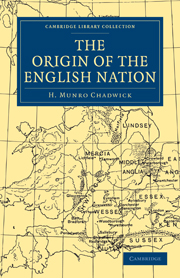Book contents
- Frontmatter
- PREFACE
- Contents
- CHAPTER I ENGLAND IN THE SIXTH CENTURY
- CHAPTER II THE WEST SAXON INVASION
- CHAPTER III THE INVASION OF KENT
- CHAPTER IV THE SAXONS, ANGLES AND JUTES IN BRITAIN
- CHAPTER V THE SAXONS, ANGLES AND JUTES ON THE CONTINENT
- CHAPTER VI THE KINGS OF ANGEL
- NOTE. THE EARLY KINGS OF THE DANES
- CHAPTER VII THE AGE OF NATIONAL MIGRATIONS
- CHAPTER VIII THE SAXONS AND ANGLES IN ROMAN TIMES
- CHAPTER IX THE CLASSIFICATION OF THE ANCIENT GERMANI
- CHAPTER X THE CULT OF NERTHUS
- CHAPTER XI KING AETHELWULF'S MYTHICAL ANCESTORS
- CHAPTER XII SOCIAL CONDITIONS OF THE ROMAN PERIOD
- ADDENDA
- INDEX
- Plate section
CHAPTER XII - SOCIAL CONDITIONS OF THE ROMAN PERIOD
Published online by Cambridge University Press: 07 September 2010
- Frontmatter
- PREFACE
- Contents
- CHAPTER I ENGLAND IN THE SIXTH CENTURY
- CHAPTER II THE WEST SAXON INVASION
- CHAPTER III THE INVASION OF KENT
- CHAPTER IV THE SAXONS, ANGLES AND JUTES IN BRITAIN
- CHAPTER V THE SAXONS, ANGLES AND JUTES ON THE CONTINENT
- CHAPTER VI THE KINGS OF ANGEL
- NOTE. THE EARLY KINGS OF THE DANES
- CHAPTER VII THE AGE OF NATIONAL MIGRATIONS
- CHAPTER VIII THE SAXONS AND ANGLES IN ROMAN TIMES
- CHAPTER IX THE CLASSIFICATION OF THE ANCIENT GERMANI
- CHAPTER X THE CULT OF NERTHUS
- CHAPTER XI KING AETHELWULF'S MYTHICAL ANCESTORS
- CHAPTER XII SOCIAL CONDITIONS OF THE ROMAN PERIOD
- ADDENDA
- INDEX
- Plate section
Summary
In Chapter VII we discussed the social and political conditions of the migration period chiefly from the evidence of native tradition. We saw that kingly government was then all but universal, though two or more kings were frequently to be found reigning together. The kings seem to have belonged to native dynasties and in general derived their claim from paternal ancestry. After the kings the most important element in the nation was the þeod, which appears to have been rather in the nature of a court than a popular assembly, consisting as it did of warriors old and young in the personal service of the kings. These persons were not exclusively members of the royal family or even born subjects of the kings, for wealthy kings attracted warriors to their service from many quarters. The government of districts and villages was granted to such warriors as a reward for their services. Generally speaking, the constitution of society, at all events in its upper strata, seems to have been military rather than tribal in character, the bond between lord and man being considered fully as strong as that of blood-relationship—equivalent perhaps to that of father and son.
When we turn to earlier times the evidence at our disposal is of a very different character. ‘Heroic tradition’ (heltesagn) is practically non-existent. Indeed, so far as the more northern nations are concerned we may say that tradition has not preserved the name of a single hero earlier than the fourth century who can be regarded as historical with any degree of probability.
- Type
- Chapter
- Information
- The Origin of the English Nation , pp. 284 - 324Publisher: Cambridge University PressPrint publication year: 2010First published in: 1924



